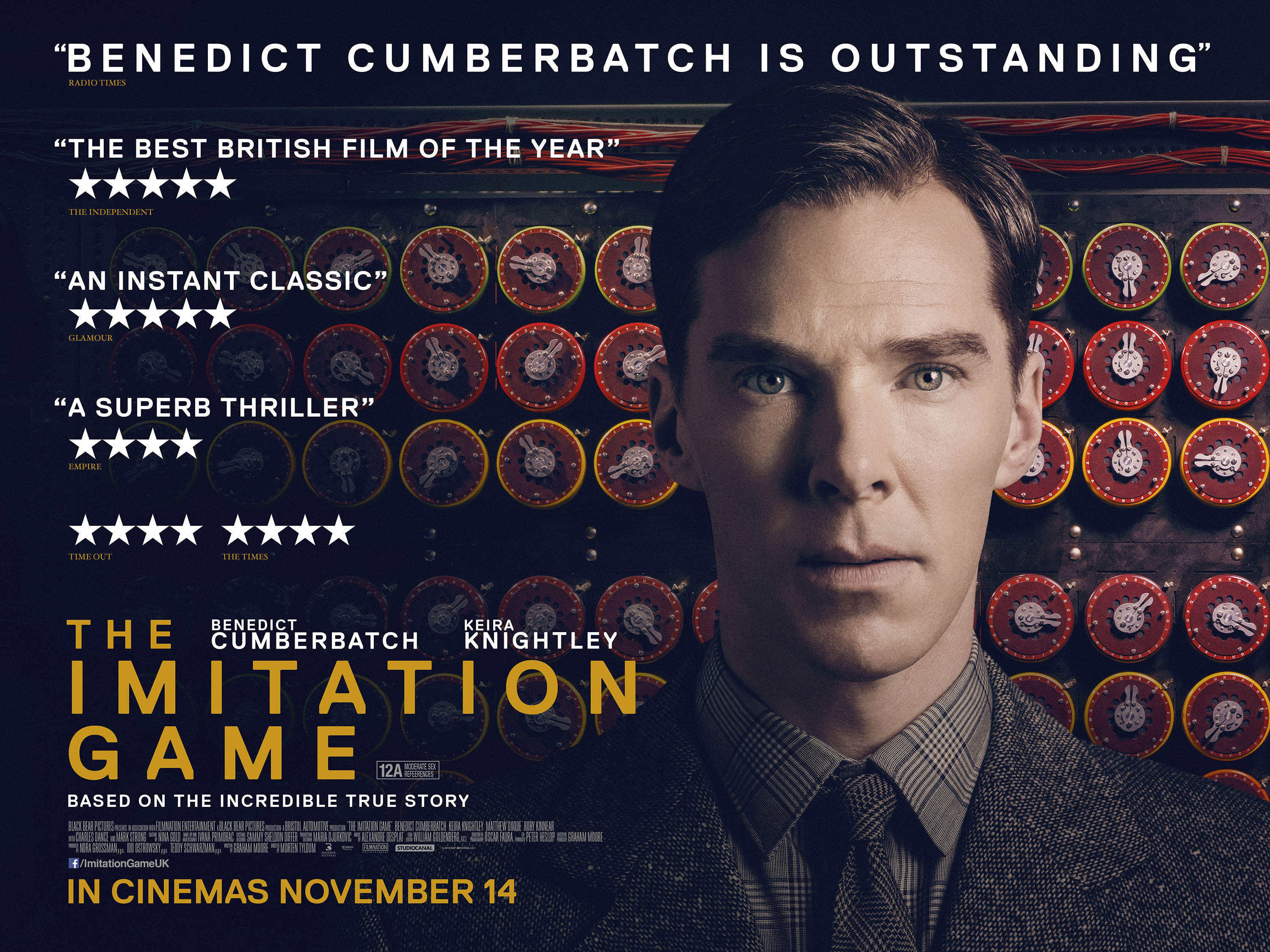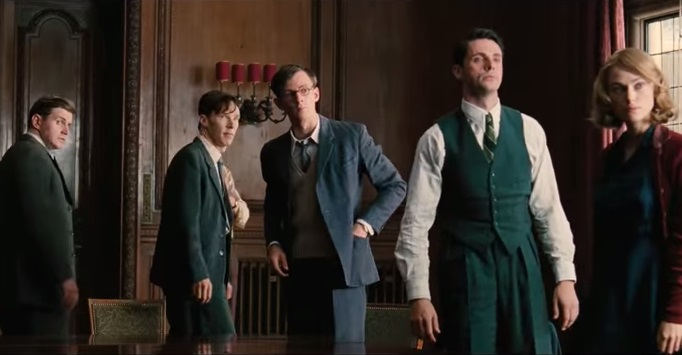THE IMITATION GAME
It is extremely, extremely tempting to look on The Imitation Game as the British answer to A Beautiful Mind (except they actually, albeit gingerly, suggest a non-traditional sexual orientation for the lead character). Alan Turing, like John Nash, was generally anti-social, unaware of the niceties of social interaction, and a brilliant, brilliant man who did great work for the world. It is also tempting to look on The Imitation Game as Benedict Cumberbatch trying his hand at both a variation of his Sherlock Holmes from Sherlock while trying to add an Oscar to his Emmy for Sherlock. The Imitation Game was respectable, almost inoffensive, and well-made. However, it's a curious thing that for a film about someone who suffered emotionally and physically as a result of his homosexuality, Turing's private life was frankly irrelevant to The Imitation Game.
Bouncing back and forth from 1951, when a break-in at the home of Professor Alan Turing (Cumberbatch) leads into an investigation that outs Turing as a homosexual rather than a Soviet spy, to 1927 when he experiences bullying and the first stirrings of love for the only classmate who shows him any kindness, The Imitation Game stays mostly in the 1940s, where Turing is part of a secret group that is tasked with breaking Enigma, the 'unbreakable' Nazi code. Turing is one of those maladjusted geniuses: literal to the point of insanity, unable to understand the nuances of social graces, and not able to work or play well with others. Brought in, with the greatest reluctance, to work on Enigma, Turing is both irritating and uncooperative with the other cryptologists assigned to the project. Project head Hugh Alexander (Matthew Goode), along with John Cairncross (Allen Leech) and Peter Hilton (Matthew Beard) find themselves working on their own while Turing tinkers with his massive machine, which he calls Christopher.
Christopher is not doing as well as Turing believes it should, and Commander Denniston (Charles Dance) can't wait to get rid of the irritating Turing. However, Turing has some unofficial help from Joan Clarke (Keira Knightley), who admires Turing's genius and is quite bright on her own. The fact that she is a woman keeps her stuck in the secretarial pool of the project, but Turing constantly seeks out a mind after his own heart. He does propose marriage, she does accept, but it won't work because he is gay, with only Cairncross figuring it out. A Eureka moment allows for a major breakthrough that breaks Enigma, but Turing is suspected of being a spy. Only the help of Stuart Menzies (Mark Strong), MI6 official, keeps Turing from being totally dismissed. The war is done, the group splits up, and then we find in the end that Turing committed suicide after finishing forced treatment that left him chemically castrated after being convicted for gross indecency.
In many ways, The Imitation Game has a bit of an identity crisis. Its focus on Turing working to break Enigma is such that when we jump in and out to Turing's pre or post-war activities (his thwarted romance with Christopher or his arrest), it seems to just wander in with little need to be there. The film itself could have been satisfactory with just the 'break Enigma' story or it could have been acceptable if it had been about an unjustly persecuted man. Instead, The Imitation Game wants it both ways and shortchanges both.
We see this regarding Turing's relationship with Clarke. The way director Morten Tyldum presents us, it does seem to be something almost genuinely romantic. We should know Turing is gay and that if Turing has any feelings for Clarke, it is one of actual respect (something he doesn't have for anyone really). However, as presented to us, if we had little to no knowledge of Turing's private life, the audience would be none the wiser. Same goes for his early fixation with Christopher. As presented to us, young Turing could merely have grown obsessed with someone who shows him genuine kindness and whatever suggestion of romance there might be is remarkably shrouded; it is almost as if there were any actual romantic or even erotic feeling within Turing, it comes from Turing's imagination. We don't get a hint that Christopher feels the same way, and his off-screen death takes away whether Christopher felt the same way about the oddball Turing.
I say 'oddball' because as both child and adult, Alan Turing comes across as more than unlikeable. He comes across as genuinely creepy, a 'low functioning sociopath' if you will. With a voice that sounds as if he has a stuffed nose and all sorts of quirks and tics, Benedict Cumberbatch's Alan Turing is a variation of his Sherlock Holmes (and no, he isn't the greatest Sherlock Holmes ever...VIVA JEREMY BRETT!). He's prickly, arrogant, and genuinely unaware of how to work with people. In some ways, it is almost amusing to see how bizarre Cumberbatch can make Turing.
Take when he presents the team he's worked hard to isolate himself from apples as a gesture. Why apples? Well, because he likes apples, and Joan told him he should give the team a gift they'd enjoy. He then tries to tell a joke in his halting, hesitant manner, though I think he genuinely doesn't understand the punchline.
As a side note, whether it is in good taste to have Turing present the team apples when his suicide involved eating a cyanide-laced apple is up to the audience. Those none the wiser might not think much of it. Those who either know or discover this (as I did) may wonder whether Graham Moore (adapting Andrew Hodges' biography, Alan Turing: The Enigma) is trying to be too clever and 'inside' with these little touches.
Cumberbatch is fine I suppose, effective but calculated as Turing. There is to me something mannered and precise in Cumberbatch's performance, where you can figure he is working to act rather than working to be. Granted, it is nowhere as mannered and calculated as his Oscar rival Eddie Redmayne in The Theory of Everything, but it is deliberate nonetheless. Since Cumberbatch is so dominant to The Imitation Game, everyone else is really there to bounce off him.
Goode has one emotion (perpetual frustration at Turing), Branson the chauffeur on Downton Abbey (who looked a bit tubby to me) was just there to provide a subplot about blackmail and espionage. Knightley has a more expanded role due to the fact that Clarke has Turing's respect and the only man who treats her as an equal, finding the mind more important than the gender.
I actually thought a film about her would have been more interesting than the film about him.
Knightley did well, but nothing that warrants the lavish praise she's earned. Still, it's good to see an actress lying about there.
One real highlight is Alexandre Desplat's score, which fit into the mathematical center of the film.
On the whole, The Imitation Game is respectable, efficient, a bit misguided because it loses focus and interest when it moves away from the central story of breaking Enigma to Turing's pre/post war life. I find The Imitation Game would work well on Masterpiece Theater, which is OK. In the end, it was good not great.
 |
| 1912-1954 |
DECISION: B-



Agreed. This movie did not impress me that much as well. I have read that the movie's version of Alan Turing is significantly different from the real one.
ReplyDeleteI guess they decided to mold Turing to Benedict's acting style rather than the other way around.
B2B.
As it stands, Cumberbatch will have to satisfy himself w/the nod, as Best Actor is a death-match between the efficient but mechanical Eddie Redmayne in Theory of Everything and Michael Keaton's 'comeback' role in Birdman.
Delete